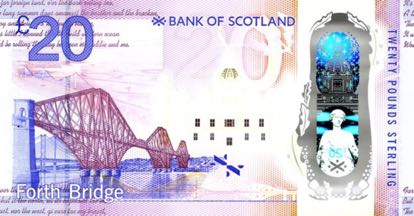Have you any money in your pocket?
A quick look might uncover some rich links between the images on the Scottish bank notes with Dunfermline and the surrounding Fife countryside:
Clydesdale Bank £5 – William Arrol and the Forth Bridge which his firm constructed – connecting Fife to Edinburgh and West Lothian
Clydesdale Bank £20 – King Robert the Bruce portrait – buried in Dunfermline Abbey
Bank of England £10 – Adam Smith, economist born in nearby Kirkcaldy
Bank of Scotland £20 – Forth Bridge, connecting Fife to Edinburgh and West Lothian
Bank of Scotland commemorative £20 – Queensferry Crossing. -connection Fife to Edinburgh and West Lothian
Royal Bank of Scotland £10 – Mary Somerville and Burntisland beach where she grew up – near Dunfermline

Do you use Snapchat? We have a wee treat using the Bank of Scotland £20 note with the Forth Bridge. Capture this Snaplense to use on your money.

Currency in Scotland can confuse visitors from around the world, including some from England!
Scotland used England’s coins for financial transactions until the reign of King David I (1124-1153). David created a Scottish mint during his reign, which was a stable and prosperous time for Scotland.
Scotland’s oldest bank is the Bank of Scotland, started in 1695 and now part of Lloyds Banking Group. Interestingly, it was started by an Englishman while the Bank of England was established by a Scotsman (in 1694). The Bank of Scotland, along with Royal Bank of Scotland and Clydesdale Bank, continue to issue Scottish banknotes today. While some people might claim they’re not legal tender, they are legal currency in Great Britain;
“The legal position with regard to Scottish Banknotes is as follows: Scottish Banknotes are legal currency – i.e. they are approved by the UK Parliament. However, Scottish Banknotes are not Legal Tender, not even in Scotland. In fact, no banknote whatsoever (including Bank of England notes!) qualifies for the term ‘legal tender’ north of the border and the Scottish economy seems to manage without that legal protection.”
Committee of Scottish Bankers